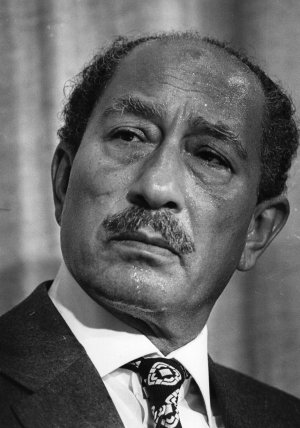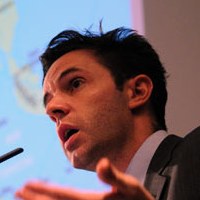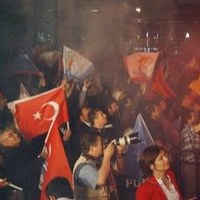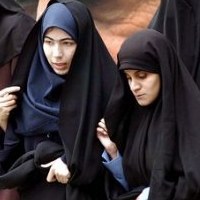![]()
Sun, March 20, 2011 | The Rubin Report | By Barry Rubin
Watch What Anwar al-Sadat Said About the Muslim Brotherhood!
Bentley [American journalist]: What, in your opinion, do these people hope to gain from this war [World War One]?
Lawrence: They hope to gain their freedom.
Bentley: They hope to gain their freedom? There’s one [sucker] born every minute!
Lawrence: They’re going to get it, Mr Bentley. I’m going to give it to them.
— From “Lawrence of Arabia”
An Egyptian Christian (Coptic) group has put up a superb six-minute video of a speech by the late (more on why he’s dead in a moment) President Anwar al-Sadat about the Muslim Brotherhood. It is very timely.
Sadat makes clear why this group is so radical, dangerous, and inevitably at some point violent. He ought to know.
Some ironies: Of course, Sadat was the leader who let the Brotherhood operate again after two decades of being banned. Even then, in the 1970s and until just about today, it has remained illegal but the group still operated and even ran candidates in elections albeit not under its own name. (Saddam Hussein in Iraq, the Syrian, and Iranian dictatorships didn’t let their opponents run under any name, which tells something about the comparative harshness of dictatorships.)
I haven’t seen a single mention in the Western media as to the reason given by Egyptian governments for keeping the Brotherhood from running candidates in the past. It was this: no party should be allowed to claim a monopoly on “proper” Islam. Remember that point because it is going to be important in future, although the Brotherhood’s new party — to make itself less scary — doesn’t have the word “Islam” in its name either.
The second irony is that Sadat was assassinated by Islamists. It is important to correct an error many have made recently. The terrorists were not Brotherhood people. But many of those terrorists who killed Sadat, joined al-Qaida, or carried out massive terrorism in Egypt in the 1990s (people now being released from prison to renew their activities) are former Brotherhood members. Radicalized and learning Islamist ideology in the Brotherhood they then went on to form or join separate radical Islamist groups.
The Brotherhood has not committed terrorism within Egypt directly (though it has, at times, endorsed terrorist murders of those deemed to be too secular) but it has been the cradle of terrorism in Egypt and even (al-Qaida; Hamas) abroad.
Finally, if you watch the brief film, keep in mind one poor piece of translation. At just before the two-minute mark, Sadat refers to the Brotherhood as viewing governments and societies as pre-Islamic. The significance of this — not explained — is that “pre-Islamic” societies are viewed by Islam as pagan and evil.
While that standpoint is definitely mainstream Islam, political Islamism’s has also produced a dangerous concept of its own at variance with traditional Islam: It claims the right to declare pious Muslims as heretics and then kill them. That is precisely what it did to Sadat, who was a very pious Muslim personally, and is the basis for their overthrowing every government (including that of Saudi Arabia) that doesn’t meet their interpretation of Islam.
Part of the problem with the Islamists is that even when they deviate from mainstream Islam, their positions may become popular and change Islam as it is practiced by many or most people. Thus, twenty years ago if you had told a mainstream Muslim cleric in the Middle East that suicide bombing was martyrdom he would have thrown you out of his office saying that such an idea was obviously heretical. Today, many mainstream clerics endorse this standpoint.
A legalized, large, and active Muslim Brotherhood (especially if it gains control of the key religious posts in Egypt, Jordan or — through Hamas — among the Palestinians) redefines mainstream Islam in a more extremist and radical direction. Sadat knew that also.
[PS: Note that the Enlightenment and Renaissance began in Europe precisely because very pious Christians there were ready to incorporate pre-Christian Classic Greek and Roman culture and philosophy into their societies. ]
Sadat and The Islamic Brotherhood
httpv://www.youtube.com/watch?v=mLe3c5QM010



 RSS
RSS











Watch What Anwar al-Sadat Said About the Muslim Brotherhood! | #Egypt #Islamism #jcot #copts http://j.mp/fdYBtf
Watch What Anwar al-Sadat Said About the Muslim Brotherhood! | #Egypt #Islamism #jcot #copts http://j.mp/fdYBtf http://ff.im/zwayd
RT @CrethiPlethi: Watch What Anwar al-Sadat Said About the Muslim Brotherhood! | #Egypt #Islamism #jcot #copts http://j.mp/fdYBtf http:/ …
RT @CrethiPlethi: Watch What Anwar al-Sadat Said About the Muslim Brotherhood! | #Egypt #Islamism #jcot #copts http://j.mp/fdYBtf http:/ …
RT @CrethiPlethi: Watch What Anwar al-Sadat Said About the Muslim Brotherhood! | #Egypt #Islamism #jcot #copts http://j.mp/fdYBtf